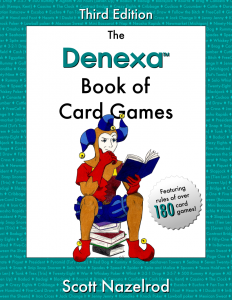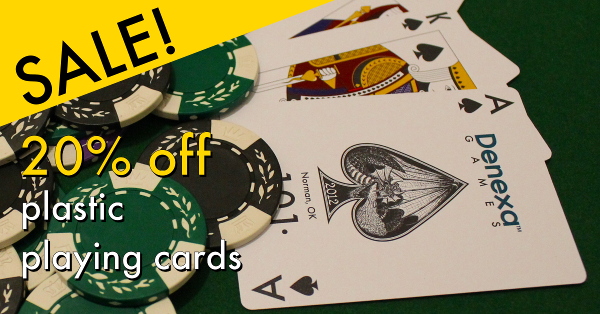Rumino
Rumino is a rummy-type game of Italian origin for two to six players. Although it is played with a double deck, and uses reverse scoring (lowest score wins), at its core it plays much like Gin Rummy. The game also includes the rumino—a special type of seven-card meld that allows a player to win the game instantly.
Object of Rumino
The object of Rumino is to be the last player remaining with a score of under 100 points. Points are scored when a player has unmelded cards remaining at the end of the hand.
Setup
Rumino is played with a 108-card deck of playing cards, formed by shuffling together two decks of Denexa 100% Plastic Playing Cards, complete with four jokers. You also need something to keep score with, such as pencil and paper.
Rumino is often played for money. If you choose to do so, all players should agree to the value of one stake. Collect this amount from each player and amass it into a pool to be won by the winner of the game.
Shuffle and deal seven cards to each player. Place the stub in the center of the table, forming the stock. Turn over the top card of the stock and place it face up next to it. This card, the upcard, is the first card in the discard pile.
Game play
The player to the dealer’s left goes first. They begin their turn by drawing a card, either the upcard or the top card of the stock. After this, they discard a card (which becomes the new upcard for the next player’s turn). The next player does the same thing on their turn.
Players are trying to form their hand into combinations of cards called melds. A meld is three or four of a kind, or three or four cards of the same suit in sequence. (Cards rank in their usual order, with aces low.) If a player holds a joker, it is wild, and can substitute for any other card in a meld. When a player forms a meld, they keep it in their hand, rather than laying it out on the table.
While a player is forming melds, they are also keeping track of their deadwood count. This is the point value of all of the cards in their hand which are not part of a meld. Aces count for one point, face cards and jokers count as ten points, and all other cards count as their face value.
Going out
When a player reaches a deadwood count of seven or less at the beginning of their turn, they may knock. Knocking must be done before a player draws to start their turn. When a player knocks, every player lays their hand face up on the table, breaking the melds out separately. Each player then has the total value of their deadwood added to their score.
If a player manages to reach a deadwood score of zero, they may go gin instead of knocking. In this case, the player going gin scores –10, while all other players score their deadwood count, as before.
Ruminos
There are two special conditions known as ruminos: seven cards of the same suit, in sequence (e.g. 7-8-9-10-J-Q-K♦) or seven of a kind. Either of these may contain jokers. When a player obtains a rumino, they reveal it, and the game ends immediately, with the player holding the rumino as the winner.
Should a player have six cards to a rumino, and a card that could be used as the needed seventh card is discarded by another player, the player holding the potential rumino may interrupt and draw it out of turn. They then reveal their newly-completed rumino and win the game, as usual.
Ending the game
If no ruminos are scored, game play continues for several hands, with players’ scores gradually increasing. When a player reaches a score of 100 or more, they drop out of the game.
If playing for money, a player may rebuy into the game by contributing more money to the pool. A player’s first rebuy is the same as the initial stake. If a player rebuys again, their second rebuy is double that amount. The third rebuy is again double the cost (four times the amount of the initial buy-in), and so on. Whenever a player rebuys, their score is reset to that of whichever opponent has the highest score under 100. A player no longer rebuy when there are only two players left in the game (i.e. whenever the third-place finisher is eliminated from the game).
Whichever player is the last remaining with a score under 100 wins the game. That player collects the entire prize pool.


